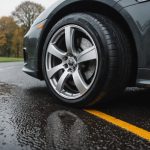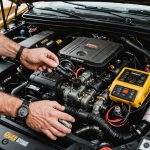Overview of Towing Legislation in the UK
In the United Kingdom, understanding the towing legislation is crucial for anyone planning to tow a caravan. Historically, towing regulations have evolved to prioritize road safety and ensure a streamlined towing experience. The legal framework governing the towing of caravans includes several acts and amendments designed to protect both drivers and other road users.
UK towing laws are primarily articulated through the Road Traffic Act and The Motor Vehicles (Driving Licences) Regulations. These bodies of law specify everything from the types of licenses required to the weight limits allowed for vehicles and caravans. Adhering to these legal requirements for towing caravans is not optional; it’s essential to prevent accidents, avoid legal penalties, and ensure safety on the road.
In parallel : Navigating the uk legal framework for ride-sharing services: essential insights on uber and beyond
Failing to comply with these requirements can lead to hefty fines and even the revocation of your driving license. It’s not just about legality; understanding these laws gives you confidence and peace of mind when towing. Recognizing the importance of these regulations can significantly reduce the risk of accidents, enhancing overall road safety for everyone. Thus, being informed about the towing legislation is not only regulatory but also a responsibility for safe travel.
Licensing Requirements for Towing Caravans
Understanding the intricacies of towing licenses within the UK is essential for anyone planning to tow a caravan. The UK has several license categories tailored to different vehicle combinations and weight specifications.
Additional reading : Crucial insights: what uk drivers need to know about new mobile phone regulations while driving
License Categories
In the UK, a standard driving license, such as Category B, allows drivers to tow trailers up to a specific combined weight, usually not exceeding 3,500 kg. For heavier combinations, a Category B+E is necessary, which permits towing of larger trailers with higher towing capacity.
Specific Towing License Requirements
To obtain a B+E license, drivers must pass an additional driving test specifically tailored to assess their towing skills. This includes maneuvers like reversing with a trailer, safe coupling and decoupling, and overall awareness of towing dynamics—vital for safe road navigation.
Exemptions for Certain Drivers
Certain exemptions apply, particularly for those who obtained their licenses before specific cut-off dates. For instance, those who acquired their license before 1997 generally have more lenient weight restrictions due to historical licensing norms. On the other hand, elderly or newly qualified drivers may face stricter regulations, necessitating further examination to ensure readiness for safe towing practices. Understanding these regulations within UK driving regulations is crucial for a seamless and lawful towing experience.
Weight Limits and Compliance
Adhering to towing weight limits is a crucial aspect of safe and legal caravan towing. UK regulations dictate specific maximum weight limits based on the vehicle type, emphasizing the need for compliance with these laws to mitigate safety risks.
Maximum Permissible Weight
The maximum permissible weight combines the vehicle’s Gross Vehicle Weight Rating (GVWR) and the combined weight of the caravan. It’s essential for drivers to know these figures, as exceeding them not only breaches legal requirements but also affects towing safety significantly.
Importance of Weighing Your Caravan
Accurate weighing of the caravan and tow vehicle ensures compliance with legal requirements and enhances road safety. Using weigh-in stations or portable scales can help obtain precise measurements, eliminating the risk of unknowingly exceeding allowable limits.
Consequences of Exceeding Weight Limits
Exceeding weight limits can lead to severe penalties, including fines and license points, while also compromising road safety by increasing the risk of accidents. Overloaded vehicles can face handling difficulties, longer stopping distances, and undue stress on the vehicle’s engine and brakes.
Staying informed and adhering to these regulations not only secures your legal standing but also ensures everyone’s safety on the road.
Vehicle Specifications for Tow Cars
Understanding vehicle specifications is crucial when choosing a tow car for your caravan. In the UK, specific vehicle regulations dictate which cars are suitable for towing, ensuring safety and legality. Knowing your vehicle’s towing capacity is paramount. This refers to the maximum weight your car can safely pull without risking mechanical failure or penalisation by authorities.
Importance of Matching Car Specifications with Caravan Weight
To ensure safety, it’s vital to match your car’s specifications with your caravan’s weight. The Gross Train Weight (GTW), which combines the weight of your vehicle and caravan, must not exceed your vehicle’s towing capacity. Checking your vehicle’s manual for the manufacturer’s recommendations can prevent exceeding these limits.
Regulations Regarding Modifications for Enhanced Towing Capacity
Sometimes, modifications are necessary to improve a vehicle’s towing ability. Changes like adding a tow bar or upgrading suspension can enhance capacity, but must comply with vehicle regulations. It’s important to have these modifications performed by certified professionals to meet legal standards and maintain towing safety. Failure to comply could result in penalties and, more critically, compromise road safety.
Understanding these specifications and regulations ensures not only legal compliance but also confidence while towing, contributing to a secure and efficient travelling experience.
Road Safety Tips for Towing Caravans
When it comes to towing safety, keen attention to detail and thorough preparation are essential. Before embarking on your journey, conduct key safety checks to ensure your caravan is road-ready. Inspect your vehicle and caravan’s tyres, brakes, lights, and coupling to confirm they are in optimal condition. These pre-checks aren’t just preventative; they are vital components of road safety regulations aimed at reducing on-road incidents.
Techniques for Safe Driving While Towing
Developing proper caravan handling techniques equates to balanced driving. Maintain a consistent speed, especially when cornering or descending slopes, and always allow extra space for braking. Sway or swerving can be minimised by distributing weight evenly inside the caravan, contributing to safer handling. Additionally, abiding by road safety regulations ensures compliance while enhancing your confidence on the road.
Importance of Planning Routes Considering Towing Restrictions
Route planning isn’t merely a convenience—it’s crucial for safely navigating restricted or unsuitable roads. Opt for wide, well-maintained roads where possible, as narrow or uneven paths can increase risk. Consulting maps or apps designed for towing can reveal low bridges or weight restrictions, preventing mishaps and ensuring your journey is smooth and secure. Adhering to these practices enhances not only legal compliance but also safety for all road users.
Common Legal Questions and Misconceptions
Navigating the intricacies of towing regulations can sometimes lead to misunderstandings. Here’s a brief exploration into commonly misunderstood laws and frequently asked questions associated with towing misconceptions.
Misunderstood Laws
One of the widespread towing misconceptions is about the necessity of specific towing licenses for various vehicle weights. Many still believe that having a basic driving license grants permission to tow all types of caravans. However, adhering to the towing weight limits specified by UK legislation is crucial, as violating these can result in hefty fines and increased safety risks.
Frequently Asked Questions
Q: Do I need a special license to tow a caravan if I obtained my license after 1997?
A: Yes, for combinations exceeding 3,500 kg, a Category B+E license is required. If your caravan and vehicle’s total weight is less, a standard Category B license suffices.
Q: Can older drivers tow larger caravans?
A: License acquisition date impacts towing permissions; those licensed before 1997 have more leeway compared to more recent licenses.
Resources for Further Information
For comprehensive guidance, turn to official resources like the DVLA and detailed handbooks on towing legislation. These sources offer authoritative insights into UK driving regulations.











